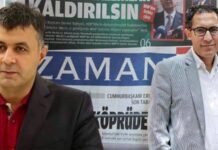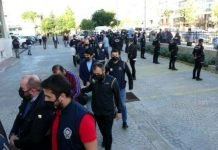Yusuf Coşkun, a former teacher imprisoned for links to the Gülen movement, wrote a letter to his brother detailing the suffering he experienced in prison while his wife, Yeşim Coşkun, was in a coma shortly before her death on May 16.
The letter was published by Bold Medya and said Coşkun could not see his sick wife for months before she died. He was only able to visit her once with special permission from the prosecutor when she was in a coma in the hospital. Coşkun said he was shocked and distraught to see his wife in that state.
Yeşim Coşkun, 44, was diagnosed with amyotrophic lateral sclerosis (ALS), a progressive nervous system disease that causes loss of muscle control, after her husband was arrested nearly five years ago. She was confined to a wheelchair and could not visit her jailed husband.
After suffering a brain hemorrhage five months before her death, Coşkun lapsed into a coma.
Coşkun said he was devasted that his two children were left without a mother and father. Both children are now with their grandmother, and Coşkun said he feared their ordeal would have long-lasting effects on their mental health.
Coşkun was arrested in January 2017 due to alleged links to the Gülen movement and was sentenced to 13 years, nine months in prison.
Turkish President Recep Tayyip Erdoğan has been targeting followers of the Gülen movement, a faith-based group inspired by Turkish cleric Fethullah Gülen, since the corruption investigations of December 17-25, 2013, which implicated then-Prime Minister Erdoğan, his family members and his inner circle.
Dismissing the investigations as a Gülenist coup and conspiracy against his government, Erdoğan designated the movement as a terrorist organization and began to target its members.
Erdoğan intensified the crackdown on the movement following a coup attempt on July 15, 2016 that he accused Gülen of masterminding. Gülen and the movement strongly deny involvement in the abortive putsch or any terrorist activity.
The purge has damaged the unity of many families and left children to the care of relatives. Such separations have had a negative impact on the mental and physical well-being of children. In cases where grandparents are responsible of the child’s care, they cannot meet every need, especially in education.
Following the abortive putsch, the Turkish government declared a state of emergency and carried out a massive purge of state institutions under the pretext of an anti-coup fight. More than 130,000 public servants, including 4,156 judges and prosecutors, as well as 29,444 members of the armed forces, were summarily removed from their jobs for alleged membership in or relationships with “terrorist organizations” by emergency decree-laws subject to neither judicial nor parliamentary scrutiny.
















